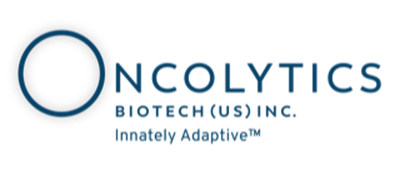Oncolytics Biotech® Files Amendment to Initiate New Pancreatic Cancer GOBLET Cohort Supported by PanCAN
Testing with the most common therapies could facilitate broad use of pelareorep in pancreatic cancer patients
"We are enthusiastic to have the support of PanCAN to expand the evaluation of pelareorep in pancreatic cancer and explore mFOLFIRINOX as another combination that could improve outcomes for patients. Notably, this patient population is newly diagnosed patients who are receiving first-line treatment. Chemotherapies, including either mFOLFIRINOX or gemcitabine and nab-paclitaxel, are the backbone treatment regimens of pancreatic cancer therapy1. Evaluating pelareorep in combination with these widely used regimens is an important step in our broad clinical development program," said Dr. Matt Coffey, President and Chief Executive Officer of Oncolytics. "Last fall, we reported a
Dirk Arnold, M.D., Ph.D., Director of Asklepios Tumorzentrum Hamburg, and primary investigator of the GOBLET trial, commented, "One of the reasons for pancreatic cancer's poor survival rate is that it effectively evades the immune system and can induce an immunosuppressive tumor microenvironment (TME)2. Pelareorep is an attractive combination partner because of its ability to address both issues by activating the innate and adaptive immune systems while driving the remodeling of the tumor microenvironment. Positive results from the Phase 2 study evaluating pelareorep combined with atezolizumab and chemotherapy reported last fall support the potential use of these agents together. I am hopeful that the combination of pelareorep and mFOLFIRINOX (with or without atezolizumab) will yield positive response data and advance the development of new treatment options for patients with pancreatic cancer."
"This study is designed to evaluate whether pelareorep can enhance outcomes in patients receiving mFOLFIRINOX, one of the most commonly used metastatic pancreatic cancer treatments. Combining pelareorep with mFOLFIRINOX represents an expansion of our existing pancreatic cancer program and maximizes the potential of pelareorep-based combination therapies to benefit pancreatic cancer patients," commented Thomas Heineman, M.D., Ph.D., Chief Medical Officer at Oncolytics. "The mFOLFIRINOX cohort utilizes a screened selection design within a Simon two-stage approach that will also allow evaluation of the contribution of atezolizumab to the pelareorep/mFOLFIRINOX combination. In addition, this study is designed to provide valuable translational assessments, such as the expansion of tumor-infiltrating lymphocytes (TILs) in the blood, which has been associated with tumor responses. We look forward to building on PanCAN's strong relationships with the pancreatic cancer community and furthering our collaboration with AIO-Studien-gGmbH (AIO) on the GOBLET study."
References
- Botta G, et al. SWI/SNF complex alterations as a biomarker of immunotherapy efficacy in pancreatic cancer. JCI Insight. 2021;6(18):e150453. https://doi.org/10.1172/jci.insight.150453.
- Yoon JH, et al. Immunotherapy for pancreatic cancer. World J Clin Cases. 2021 May 6;9(13):2969-2982. doi: 10.12998/wjcc.v9.i13.2969. PMID: 33969083; PMCID: PMC8080736.
About GOBLET cohort 5
The mFOLFIRINOX cohort of the Phase 1/2 GOBLET study is designed to evaluate newly diagnosed PDAC patients treated with pelareorep + mFOLFIRINOX with or without atezolizumab. There will be a three-patient safety run-in to evaluate the tolerability of each treatment arm - pelareorep + mFOLFIRINOX + atezolizumab and pelareorep + mFOLFIRINOX. A total of fifteen patients may be randomized to each arm in Stage one of the Simon-two stage design. The co-primary endpoints of the cohort are objective response rate and safety. The success criteria for Stage 1 is defined as six or more responses in one or both of the treatment groups. Successful completion of Stage one will support expansion into Stage two, which can include one or both treatment regimens, and would enroll 17 additional evaluable patients. A total of 13 or more responses from Stage 1 and 2 combined are required to achieve the success criteria. Translational data will also be generated.
About GOBLET
The GOBLET (Gastrointestinal tumOrs exploring the treatment comBinations with the oncolytic reovirus peLarEorep and anTi-PD-L1) study is a phase 1/2 multiple indication study in advanced or metastatic gastrointestinal tumors. The study is being conducted at 12 centers in
- Pelareorep in combination with atezolizumab, gemcitabine, and nab-paclitaxel in 1st line advanced/metastatic pancreatic cancer patients;
- Pelareorep in combination with atezolizumab in 1st line MSI (microsatellite instability)-high metastatic colorectal cancer patients;
- Pelareorep in combination with atezolizumab and TAS-102 in 3rd line metastatic colorectal cancer patients
- Pelareorep in combination with atezolizumab in 2nd line advanced and unresectable anal cancer patients; and
- Pelareorep in combination with mFOLFIRINOX with and without atezolizumab in newly diagnosed metastatic PDAC patients.
Any cohort meeting pre-specified efficacy criteria in Stage 1 may be advanced to Stage 2 and enroll additional patients.
About AIO
AIO-Studien-gGmbH (AIO) emerged from the study center of the internal oncology working group within the German Cancer Society (DKG). AIO operates with a non-profit purpose of promoting science and research with a focus on medical oncology. Since its foundation, AIO has become a successful sponsor and study management company and has established itself both nationally and internationally.
About Oncolytics Biotech Inc.
Oncolytics is a clinical-stage biotechnology company developing pelareorep, an intravenously delivered immunotherapeutic agent. Pelareorep has demonstrated promising results in Phase 2 studies in breast and pancreatic cancers. It acts by inducing anti-cancer immune responses and promotes an inflamed tumor phenotype -- turning "cold" tumors "hot" -- through innate and adaptive immune responses to treat a variety of cancers.
Pelareorep has demonstrated synergies with multiple approved oncology treatments. Oncolytics is currently conducting and planning combination clinical trials with pelareorep in solid and hematological malignancies as it advances towards registrational studies in metastatic breast cancer and pancreatic cancer, both of which have received Fast Track designation from the FDA. For further information, please visit: www.oncolyticsbiotech.com or follow the company on social media on LinkedIn and on X @oncolytics.
This press release contains forward-looking statements, within the meaning of Section 21E of the Securities Exchange Act of 1934, as amended and forward-looking information under applicable Canadian securities laws (such forward-looking statements and forward-looking information are collectively referred to herein as "forward-looking statements"). Forward-looking statements contained in this press release include Oncolytics' belief as to the potential, mechanism of action and benefits of pelareorep as a cancer therapeutic; our stated goals, objectives and mission; our belief that pelareorep in combination with mFOLFIRINOX could improve outcomes for pancreatic cancer patients and advance the development of new treatment options for patients with pancreatic cancer; our plans to build on PanCAN's strong relationships with the pancreatic cancer community and further our collaboration with AIO-Studien-gGmbH on our GOBLET study; our plans to advance towards registrational studies in metastatic breast cancer and pancreatic cancer; and other statements related to anticipated developments in Oncolytics' business and technologies. In any forward-looking statement in which Oncolytics expresses an expectation or belief as to future results, such expectations or beliefs are expressed in good faith and are believed to have a reasonable basis, but there can be no assurance that the statement or expectation or belief will be achieved. Such forward-looking statements involve known and unknown risks and uncertainties, which could cause Oncolytics' actual results to differ materially from those in the forward-looking statements. Such risks and uncertainties include, among others, the availability of funds and resources to pursue research and development projects, the efficacy of pelareorep as a cancer treatment, the success and timely completion of clinical studies and trials, Oncolytics' ability to successfully commercialize pelareorep, uncertainties related to the research and development of pharmaceuticals, uncertainties related to the regulatory process and general changes to the economic environment. In particular, we may be impacted by business interruptions resulting from COVID-19 coronavirus, including operating, manufacturing supply chain, clinical trial and project development delays and disruptions, labour shortages, travel and shipping disruption, and shutdowns (including as a result of government regulation and prevention measures). We may incur expenses or delays relating to such events outside of our control, which could have a material adverse impact on our business, operating results and financial condition. Investors should consult Oncolytics' quarterly and annual filings with the Canadian and
Company Contact Jon Patton Director of IR & Communication +1-858-886-7813 | Investor Relations for Oncolytics Timothy McCarthy LifeSci Advisors +1-917-679-9282 |
Logo - https://mma.prnewswire.com/media/1762876/4575723/Oncolytics_Biotech_New_Logo.jpg
![]() View original content to download multimedia:https://www.prnewswire.com/news-releases/oncolytics-biotech-files-amendment-to-initiate-new-pancreatic-cancer-goblet-cohort-supported-by-pancan-302079547.html
View original content to download multimedia:https://www.prnewswire.com/news-releases/oncolytics-biotech-files-amendment-to-initiate-new-pancreatic-cancer-goblet-cohort-supported-by-pancan-302079547.html
SOURCE Oncolytics Biotech® Inc.








